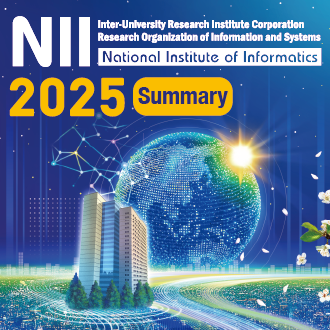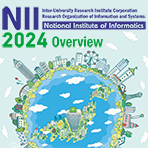EVENT
Event News
Lectures on Numerical Linear Algebra (7, 13 Jan.)
Outline
January 7th (Thursday)
- Room:
- No. 1212 (Lecture Room 1), 12F
1-2pm
- Speaker:
- Professor Jun-Feng Yin (Department of Mathematics, Tongji University, Shanghai)
- Title:
- Modulus-based matrix splitting methods for linear complementary problem
- Abstract:
- For the large sparse linear complementarity problem, a class of accelerated modulus-based matrix splitting iteration methods is established by reformulating it as a general implicit fixed-point equation, which covers the known modulus-based matrix splitting iteration methods. The convergence conditions are presented when the system matrix is either a positive definite matrix or an H +-matrix. Numerical experiments further show that the proposed methods are efficient and accelerate the convergence performance of the modulus-based matrix splitting iteration methods with less iteration steps and CPU time.
2-3pm
- Speaker:
- Professor Lothar Reichel (Department of Mathematical Sciences, Kent State University, Kent)
- Title:
- Generalized cross validation for Tikhonov regularization of large-scale problems
- Abstract:
- Generalized Cross Validation (GCV) is a popular approach to determining the regularization parameter in Tikhonov regularization. The regularization parameter is chosen by minimizing an expression, which is easy to evaluate for small-scale problems, but prohibitively expensive to compute for large-scale ones. We describe a novel method, based on Gauss-type quadrature, for determining upper and lower bounds for the desired expression. These bounds are used to determine the regularization parameter for large-scale problems. This talk presents joint work with Caterina Fenu and Giuseppe Rodriguez.
3-4pm
- Speaker:
- Professor Lothar Reichel (Department of Mathematical Sciences, Kent State University, Kent)
- Title:
- Rational Arnoldi methods
- Abstract:
- This talk considers the approximation of expressions of the form $f(A)v$, where $A$ is a large square matrix, $v$ a vector, and $f$ a function. Approximants are determined in rational Krylov subspaces. We explore the structure of the recursion relations and discuss the implementation of rational Krylov methods. This talk presents joint work with Miroslav Prani¥'c, Giuseppe Rodriguez, Zhengsheng Wang, and Xuebo Yu.
January 13th (Wednesday)
- Room:
- No. 1208, 12F
1-2pm
- Speaker:
- Professor Zhong-Zhi Bai (Institute of Computational Mathematics and Scientific/Engineering Computing, Chinese Academy of Sciences, Beijing)
- Title:
- Scalable and Fast Iteration Methods for Complex Linear Systems
- Abstract:
- Complex system of linear equations arises in many important applications. We further explore algebraic and convergence properties and present analytical and numerical comparisons among several available iteration methods such as C-to-R and PMHSS for solving such a class of linear systems. Theoretical analyses and computational results show that reformulating the complex linear system into an equivalent real form is a feasible and effective approach, for which we can construct, analyze and implement accurate, efficient and robust preconditioned iteration methods.
2-3pm
- Speaker:
- Professor Yimin Wei (School of Mathematical Sciences, Fudan University, Shanghai)
- Title:
- Generalized Tensor Eigenvalue Problems
- Abstract:
- This talk is devoted to generalized tensor eigenvalue problems. We focus on the properties and perturbations of the spectra of regular tensor pairs. Employing different techniques, we extend several classical results from matrices or matrix pairs to tensor pairs, such as the Gershgorin circle theorem, the Collatz–Wielandt formula, the Bauer–Fike theorem, the Rayleigh–Ritz theorem, backward error analysis, the componentwise distance of a nonsingular tensor to singularity, etc. Some of these results preserve their original forms, while others change when being extended.
3-4pm
- Speaker:
- Professor Michael Eiermann (Institut fuer Numerische Mathematik und Optimierung, TU Bergakademie Freiberg)
- Title:
- The State of the Forsythe-Motzkin Conjecture
- Abstract:
- In 1951, George E. Forsythe and Theodore S. Motzkin investigated the socalled s-step optimum gradient method for solving symmetric systems of linear algebraic equations. They were particularly interested in the special case of s = 1 which represents the well known method of steepest descent.
In numerical experiments, they observed that the sequence of the associated error vectors is "asymptotically of period 2", proved this statement for problems of dimension n = 3 and conjectured that it holds for all n. It was Hirotugu Akaike who _rst proved this conjecture in 1959. Later, in 1968, Forsythe reconsidered the problem and generalized some (but not all) of Akaike's results from the case of s = 1 to the case of s > 1.
It turns out that the periodicity phenomenon observed by Forsythe and Motzkin is not really related to linear systems but arises when bases of Krylov subspaces are generated by the restarted Lanczos process. For any restart length s _ 1, numerical experiments indicate that the sequence of the thereby generated s-dimensional Krylov subspaces is "asymptotically of period 2", i.e., alternates asymptotically between two s-dimensional spaces.
So far this observation has not been proven.
In this talk, we review three different approaches to the Forsythe-Motzkin conjecture which, in its original version, is a problem in linear algebra but can be rephrased in terms of orthogonal polynomials or probability distributions. We describe the current state of the conjecture und explain why we believe that it is a difficult problem.
Contact
Prof. Ken Hayami
hayami[at]nii.ac.jp *Please replace [at] with @.

 Summary of NII 2024
Summary of NII 2024 NII Today No.104(EN)
NII Today No.104(EN) NII Today No.103(EN)
NII Today No.103(EN) Overview of NII 2024
Overview of NII 2024 Guidance of Informatics Program, SOKENDAI 24-25
Guidance of Informatics Program, SOKENDAI 24-25 NII Today No.102(EN)
NII Today No.102(EN) SINETStream Use Case: Mobile Animal Laboratory [Bio-Innovation Research Center, Tokushima Univ.]
SINETStream Use Case: Mobile Animal Laboratory [Bio-Innovation Research Center, Tokushima Univ.] The National Institute of Information Basic Principles of Respect for LGBTQ
The National Institute of Information Basic Principles of Respect for LGBTQ DAAD
DAAD
